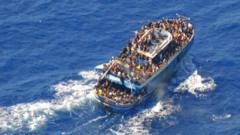In a landmark decision, 17 members of the Hellenic Coast Guard have been charged in relation to the fatal sinking of a migrant ship off the coast of Greece, where up to 650 individuals are feared to have lost their lives.
Charges Filed Against Greek Coastguards in Deadly Migrant Shipwreck

Charges Filed Against Greek Coastguards in Deadly Migrant Shipwreck
The Greek naval court indicted 17 coastguards in connection with the tragic sinking of a migrant vessel, raising serious questions about their actions during the disaster.
A naval court in Greece has charged 17 coastguards in connection with the 2023 migrant shipwreck, one of the deadliest maritime disasters in the Mediterranean in a decade. The Adriana fishing vessel, which was carrying 650 individuals, sank near Pylos in the early morning hours of June 14, 2023, leading to fears that most of its passengers drowned. Survivors allege that the coastguards mishandled rescue efforts, leading to the capsizing of their vessel, and subsequently silenced witnesses to the tragic incident. Ahmad, a Syrian survivor, expressed frustration that it took two years for charges to materialize despite many eyewitness testimonies.
The Deputy Prosecutor of the Piraeus Naval Court has charged, among others, the captain of the coastguard ship LS-920 for causing a shipwreck that resulted in the death of "at least 82 individuals," although estimates suggest the total fatalities may be over 500, many of whom were women and children trapped below deck. The disaster occurred in international waters but was within Greece’s designated search and rescue zone. Additional charges have been leveled against multiple officials for exposing others to danger and failing to provide assistance.
Investigations have yielded information that contradicts the official Greek narrative, particularly regarding coastguard patrols that monitored the Adriana for 15 hours prior to its sinking. Claims made by survivors, supported by shipping data, suggest that the coastguard's attempts to tow the vessel contributed to its capsizing. Witness accounts speak about a culture of intimidation, describing how officials attempted to silence any discussion regarding their alleged role in exacerbating the disaster.
Ahmed and Musaab, also Syrian refugees, recall the harrowing moment their boat capsized after the coastguard boat pulled its ropes quickly. They reported feeling threatened upon arrival in Kalamata, where coastguards were said to discourage any further mention of the incident. Ahmad, now residing in Germany, expressed a sense of justice at the recent charges, though he remains skeptical about the reliability of the Greek legal system.
Legal representatives for the victims welcomed the charges as a significant step towards justice, emphasizing the importance of accountability from the coastguards, especially higher-ranking officials. As authorities prepare to question the charged individuals in the coming weeks, the case remains a crucial focal point for discussions about maritime safety and human rights in Europe. The potential outcomes for those charged are still uncertain, with implications that could impact Greece’s reputation concerning humanitarian efforts, despite previous claims of adherence to human rights in rescue operations.























